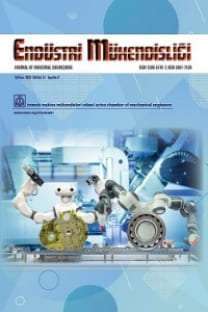Sıra bağımlı hazırlık süreli iki ölçütlü tek makine çizelgeleme problemi için sezgisel bir çözüm yöntemi
A heuristic for bicriteria single machine scheduling problem with sequence dependent setup times
___
- 1. Armentano, V.A., Mazzini, R. 2000. “A Genetic Algorithm For Scheduling On A Single Machine With Set-Up Times And Due Dates,” Production Planning and Control, 11, 713–720.
- 2. Asano, M., Ohta, H. 1999. “Scheduling With Shutdowns And Sequence Dependent Set-Up Times,” International Journal of Production Research, 37, 1661–1676.
- 3. Chang, T.Y., Chou, F.D., Lee, C.E. 2004. “A Heuristic Algorithm To Minimize Total Weighted Tardiness On A Single Machine With Release Dates And Sequence-Dependent Setup Times,” Journal of the Chinese Institute of Industrial Engineers, 21, 289–300.
- 4. Chankong, V., Haimes, Y.Y. 1983. “Multiobjective Decision Making: Theory and Methodology”, Elsevier Science Publishing Co, New York.
- 5. Choobineh, F.F., Mohebbi, E., Khoo, H. 2006. “A Multi-Objective Tabu Search For A Single-Machine Scheduling Problem With Sequence-Dependent Setup Times,” European Journal of Operational Research, 175, 318–337.
- 6. Ehrgott, M. 2005. “Multicriteria Optimization,” Springer-Verlag, 2nd edition.
- 7. Eren, T., Guner, E. 2006. “A Bicriteria Scheduling With Sequence Dependent Setup Times,” Applied Mathematics and Computation, 179, 378–385.
- 8. Franca, P.M., Mendes, A., Moscato, P. 2001. “A Memetic Algorithm For The Total Tardiness Single Machine Scheduling Problem,” European Journal of Operational Research, 132, 224–242.
- 9. Gagne, C., Price, W.L., Gravel, M. 2002. “Comparing an ACO Algorithm With Other Heuristics For The Single Machine Scheduling Problem With Sequence-Dependent Setup Times,” Journal of the Operational Research Society, 53, 895–906.
- 10. Gupta, S.R., Smith, J.S. 2006. “Algorithms For Single Machine Total Tardiness Scheduling With Sequence Dependent Setups,” European Journal of Operational Research, 175, 722–739.
- 11. Kolahan, F., Liang, M. 1998. “An adaptive TS Approach To JIT Sequencing With Variable Processing Times And Sequencedependent Setups,” European Journal of Operational Research, 109, 142–159.
- 12. Lee, S.M., Asllani, A.A. 2004. “Job Scheduling With Dual Criteria And Sequence-Dependent Setups: Mathematical Versus Genetic Programming,” Omega, 32, 145–153.
- 13. Luc, D.T. 1989. “Theory of Vector Optimization,” Lecture Notes in Economics and Mathematical Systems, Springer Verlag, Berlin.
- 14. Mendes, A.S., Franca, P.M., Moscato, P. 2002. “Fitness Landscapes For The Total Tardiness Single Machine Scheduling Problem,” Neural Network World, 12, 165–180.
- 15. Miller, D.M., Chen, H.C., Matson, J., Liu, Q. 1999. “A Hybrid Genetic Algorithm For The Single Machine Scheduling Problem,” Journal of Heuristics, 5, 437–454.
- 16. Pinedo, M. 2002. “Scheduling: Theory, Algorithms and Systems,” 2nd Edition, Prentice Hall.
- 17. Rabadi, G., Mollaghasemi, M., Anagnostopoulos, G.C. 2004. “A Branch-And-Bound Algorithm For The Early/ Tardy Machine Scheduling Problem With A Common Due-Date And Sequence Dependent Setup Time,” Computers and Operations Research, 31, 1727–1751.
- 18. Rajendran, C., Ziegler, H. 2003. “Scheduling to Minimize the Sum of Weighted Flowtime and Weighted Tardiness of Jobs in A Flowshop with Sequence-Dependent Setup Times,” European Journal of Operational Research, 149 (3), 513–522.
- 19. Shin, H.J., Kim, C.O., Kim, S.S. 2002. “A Tabu Search Algorithm For Single Machine Scheduling With Release Times, Due Dates, And Sequence-Dependent Set-Up Times,” International Journal of Advanced Manufacturing Technology, 19, 859–866.
- 20. Tan, K.C., Narasimhan, R. 1997. “Minimizing Tardiness On A Single Processor With Sequence-Dependent Setup Times: A Simulated Annealing Approach,” Omega, 25, 619–634.
- 21. Tan, K.C., Narasimhan, R., Rubin, P.A., Ragatz, G.L. 2000. “A Comparison Of Four Methods For Minimizing Total Tardiness On A Single Processor With Sequence Dependent Setup Times,” Omega, 28, 313–326.
- 22. Wang, L., Wang, M. 1997. “Hybrid Algorithm For Earliness–Tardiness Scheduling Problem With Sequence Dependent Setup Time,” Proceedings of the IEEE Conference on Decision and Control, 2, 1219–1222.
- ISSN: 1300-3410
- Yayın Aralığı: 3
- Başlangıç: 1989
- Yayıncı: TMMOB MAKİNA MÜHENDİSLERİ ODASI
Nuray GİRGİNER, Zeliha KAYGISIZ
Paralel makinalarda ürün tasarımı özellikleri ile iş çizelgelemenin bütünleştirilmesi
Mehmet Bülent DURMUŞOĞLU, Murat BASKAK, Emre ÇEVİKCAN
İstanbul’da itfaiye istasyonu yerlerinin seçimi için yeni bir model
Özay ÖZAYDIN, Emel AKTAŞ, Füsun ÜLENGİN, Şule ÖNSEL, Berrin AĞARAN
